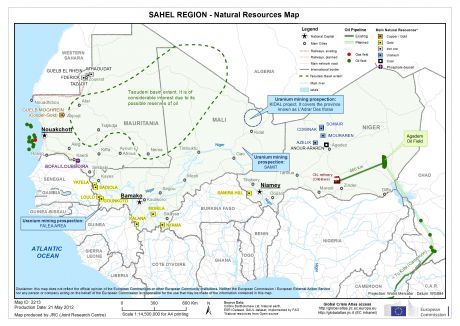Features
You are here
Mali and Canadian mining in Africa

March 5, 2013
The NATO war in Mali is expanding and Harper is doing all he can to help steal the riches of that land for Canadian mining corporations.
The UK has just agreed to send 40 troops and another $5 million to support the French led operation and Harper is due to renew his contribution to the takeover on March 14. Other African nations have also begun to mobilize troops.
Once again we see an open-ended intervention that may drag on and become the African version of NATO’s quagmire Afghanistan. The West has no intention of leaving the continent to its own people; there is too much money to be made.
While the intervention in Mali has fallen off the front pages on Canadian newspapers, the business sections have been abuzz with stories of Canadian mines in more or less trouble because of potential unrest. According to Robert Besseling, deputy head of Africa forecasting at the political risk firm Exclusive Analysis, certain area of the continent are becoming harder to mine in because of what he terms “resource nationalists”—or people who are opposed to the pillaging of their land.
And Canadian corporations—like Barrick Gold, the largest gold-mining company in the world—have a lot of pillaging to do. Canadian mining investment in Africa has reached $31 billion, up from only $5 billion in 2005. That is a rapid acceleration that is also resulting in more blow-back.
In 2011, people in Tanzania attacked a Barrick gold mine, protesting the destruction of both their land and their livelihood. It is estimated that 400,000 African miners have lost their jobs due to the large multinationals moving in. The response was swift: police and security forces killed seven people to keep them away from the mines.
Like the De Beers diamond mine that loots millions while nearby indigenous people in Attawapiskat are denied basic housing, mining in Africa steals riches while leaving people in poverty. Tanzania is one of the poorest countries on earth, despite having roughly $40 billion in gold reserves. It is also, by no coincidence, one of the countries that Canada has targeted for a new Canadian military base--part of Harper's plan to spend $490 billion on the military over 20 years.
When one begins to dig into the recent history of Canadian mining in Africa the picture get even worse. In January, Human Rights Watch released a report that showed that Canadian corporation Nevsun Resources in Eritrea were using child slave labour to construct its mines. These are children that have been rounded up by the Eritrean security forces and are used for lots of projects that help the multinationals. In a disgusting display of greed, the scandalous report was followed up by news that other Canadian corporations Sunridge Gold Corp are itching to get in on such a lucrative venture. Slave labour means even more profit.
As the Harper government gets set to renew the Canadian forces deployment to Mali, we all need to spread the word about Canada's real record in Africa and mobilize to stop it—connecting the fight against imperialism abroad with the Idle No More movement against colonialism at home, and demanding peace and prosperity not war and austerity.
Section:
Topics:










